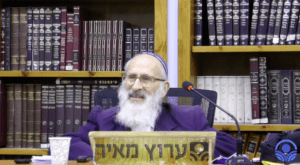Gentle Rebuke
HaRav Shlomo Aviner, Head of Yeshivat Ateret Yerushalayim

[Ashkenazim/Sefardim: Yeshayahu 1:1-27
Yemenite Jews: Yeshayahu 1:1-31]
Although the prophet Yeshayahu compared the behavior of Israel to the residents of Sedom and Amorah, he still carefully guarded his love for them. We hear the message clearly, since “things that come from the heart, enter the heart.”
“Hear the word of Hashem, officers of Sedom, listen to the Torah of our G-d, Nation of Amorah” (Yeshayahu 1:10). The harshness of the prophet’s words shocks us. Sedom and Amorah are the supreme symbols of wickedness and ethical decay. This is similar in our day to calling another person a Nazi! How could such abusive words emanate from the mouth of the prophet, the loyal agent of the Master of the Universe?! “Sinful Nation, a Nation loaded with guilt, seed of evildoers, children given to corruption” (ibid. v, 4)! “Therefore, the Master, Hashem of Hosts, the Mighty One of Israel, declares: I will get relief from My foes and avenge Myself on my enemies” (ibid. v. 24).” Is it really possible to relate to the Nation of Israel as the enemy of Hashem?
In the face of such harshness, we must point out that according to Halachah the mitzvah of rebuke must be accomplished with gentleness and love (see Rambam, Hilchot De’ot 6:8), since words spoken aggressively are never heard. In addition, this mitzvah must be accompanied by two other mitzvot: Do not hate your brother in your heart and love him. “Things that come from the heart enter the heart” (Maharam Alshich on the verse “With all your heart”). Rebuke out of love, saturated with affection for the other person, cannot be refused, while harsh words are ignored from the outset.
But – don’t worry – Yeshayahu is not delivering hatred. Despite his harsh words, he is a prophet of love. All of his prophecies are laced with love and comfort. In the same chapter, he says “Zion will be redeemed with justice, and those who return to her with righteousness” (ibid. v. 27). For the Nation of Israel, nothing is irreversible: “I will restore your judges as in days of old, your counselors as at the beginning. Afterward you will be called the City of Righteousness, the Faithful City” (ibid. v. 26). What a sign of loyalty!
How then can we reconcile the difficult nature of this prophecy? Through a parable brought by our Rabbis in the Zohar: A father is enraged at his son and is ready to hit him. His mother yells and stops the father’s impeding strike. The son sighs a sigh of relief. What he did not know is that his two parents were in it together. Their roles complemented one another: one represented strict punishment and the other represents security and forgiveness (Zohar, Vayikra 14:2). Did the father really want to wound his son? Did the mother really want to ignore her son’s sinful behavior? The parents therefore created a plan to instill fear into the child and put him on the correct path.
This parable is used to explain the aftermath of the Sin of the Golden Calf. “Hashem said to Moshe…Leave Me now so My anger will burn against them and I will destroy them” (Shemot 32:10). This was obviously not Hashem’s intention. He remained the loving and merciful Father, but wanted to instill fear within us so we would repent.
The Zohar teaches us the role of the mother who would save her son – before Moshe Rabbenu even knew it. Hashem therefore hinted to Moshe Rabbenu: “Leave Me.” Moshe Rabbenu then understood that it was his responsibility to pray and plead for Divine forgiveness for His Nation. The Torah tells us that his request was answered, and he succeeded in canceling the Divine punishment. But if it were not for the fact that Hashem forgave them for the Sin of the Golden Calf, they would not have understood either the severity of their sin or their ability to repent.
The same applies to Yeshayahu. He had to shock the Nation of Israel so that they would understand their corrupt ways and return to the right path. “Wash and make yourselves pure, take your evil deeds out of my sight! Stop doing evil. Learn to do right, seek justice, encourage the oppressed, defend the orphan, plead for the widow” (ibid. v. 16-17). We clearly see that the prophet had complete hope and trust that he could help the Nation repent. “Come and reason together, says Hashem, though your sins are like scarlet, they will be as white as snow, though they are red as crimson, they will be like wool. If you are willing and obedient, you will eat from the best of the Land” (ibid. v. 18-19).
If we review all of Yeshayahu’s prophecies, we see that his words are always words of comfort. He is the one who discusses the coming of the Messiah at length (chap. 11). Out of this fatherly love occasionally appears tough rebuke, but included in it are expressions of love. The right and obligation of a loving father is to occasionally deliver harsh rebuke to his son.
The Nation of Israel did not question for even a second Yeshayahu’s love and self-sacrifice for them, and his unending faith that the Nation would return to the ethical and holy path.





